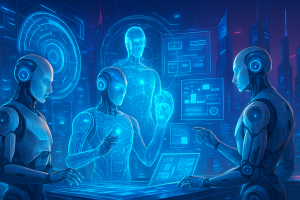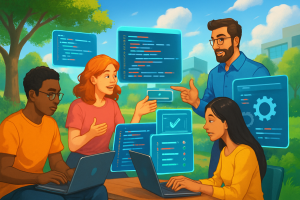Google has recently announced its latest AI model, Gemini 2.0, marking a significant advancement in artificial intelligence technology as it enters what is referred to as the “agentic era.” This model is designed to enhance user interactions and developer experiences across Google’s extensive ecosystem.
What’s New with Gemini 2.0?
Agentic Experiences
A standout feature of Gemini 2.0 is its emphasis on “agentic” AI—intelligent systems capable of autonomously performing tasks on behalf of users. Several innovative prototypes have been introduced to illustrate this concept:
- Project Astra: This universal AI assistant is designed to understand and engage with its surroundings, providing real-time assistance in multiple languages by utilizing Google’s tools such as Search, Lens, and Maps. This development could revolutionize user interactions through devices like smart glasses or smartphones.
- Project Mariner: An experimental Chrome extension that enables navigation and interaction within a browser environment, executing tasks based on user commands. This prototype highlights the potential for AI to manage web-based activities, including form filling and online research directly from the browser.
- Jules: An AI coding assistant aimed at supporting developers by managing repetitive coding tasks, fixing bugs, and even planning within GitHub workflows. This tool is intended to streamline development processes, allowing developers to concentrate on more innovative aspects of their work.
Multimodal Capabilities
Gemini 2.0 also introduces advanced multimodal functionalities that enable the model to comprehend, generate, and manipulate various data types, including text, images, audio, and video. Unlike previous models that required external tools for generating images or audio, Gemini can now perform these tasks natively. This integration facilitates a more seamless user experience where requests for images, audio descriptions, or intricate visual edits can be made within a single conversation.
Speed and Performance
The new Gemini 2.0 Flash variant boasts impressive speed and efficiency compared to its predecessors. It is reported to operate at twice the speed of the Gemini 1.5 Pro while maintaining or even exceeding performance on critical benchmarks. This enhanced speed is vital for real-time applications like live translation or interactive assistants, where latency can greatly impact user satisfaction. Developers can leverage this model to create applications that respond with remarkable quickness, enabling real-time audio and video streaming capabilities.
Where Can You Try Gemini 2.0?
Developers interested in experimenting with Gemini 2.0 can access it via the Gemini API in Google AI Studio and Vertex AI. Users looking to experience this technology can find it in the Gemini app as an experimental chat model by selecting it from the model drop-down menu on desktop or mobile web platforms.
Pricing Information
While detailed pricing information has not yet been fully disclosed, Google generally provides various tiers for accessing its AI models based on usage levels and required features. However, users can try out Gemini 2.0 for free in Google AI Studio.
Conclusion
In conclusion, Gemini 2.0 signifies a major leap forward in Google’s AI technology landscape, offering robust new tools for both developers and everyday users. Whether enhancing productivity or exploring new AI possibilities, this model is poised to create a substantial impact in various applications. As Google continues to introduce exciting features across its products in the coming months, staying informed will be beneficial for all users.
Feedback is welcome in the comments below from those who have already had a chance to try out this innovative technology!
Read more such articles from our Newsletter here.



